#income system report
Explore tagged Tumblr posts
Text
one thing I have learned about being poor is that you cannot for a moment stop thinking about it
#theres no peace#every little thing reminds me we are poor#seeing friends having electricity wifi heat food gas. it all costs money. and bills and fees and charges happen all the damn time#im constantly worried that i am measing up somehow or im not keeping track of my finances properly#the person handling our disability assistance application keeps coming back with question after question about my job#and i have so much doubt and fear that ive made some mistake in my answers that will disqualify us from support#and theres this sick backwards stupid thing where applying for and being on disability support is discouraging me from trying to make money#because the more i make the less likely we'll get support but i need to make money to live#its just fucked. and once we're on support i have to make monthly reports of my income so ill feel like im explaining myself all the fuckin#time#cus the system isnt built in a way that makes sense for self employed ppl who have business expenses to account for#sorry for the ranting i cant sleep#truly truly i think poverty is making me a worse persin#more anxious more resentful more jealous more miserable more spiteful#i have so little and there is so little i can do to help it#i want things in a more desparate and even childish way than i used to eant things#spend a lot more time fantasizing about magically having expendable income#not to mention the constant exponential guilt that comes from asking for help or recieving help. its guilt i need to unlearn but i feel it
132 notes
·
View notes
Link
Thank you Yale thank you Harvard thank you UC Berkley thank you Stanford. <3
#especially props to yale for doing the right thing and leading this because they were actually ranked 1 and benefited from the old system#quite a bit#and still brought up the disparate impact this was having against schools that prioritized#public service careers and socioeconmic diversity#my school got screwed by the rankings even though it was voted best in other reports for elevating the economic status of it's incoming#students#and has the best environmental law program in the country#and has a bar passage rate slightly above the state average#and ny has the 2nd hardest bar exam
21 notes
·
View notes
Text

it’s ✨okay✨, right~?
#s o rry rant incoming im just. re a l l y crabby after working for 8.5 consecutive hours with no proper break okie~? </3#ayEEEEEEEEEEEEEE THE ADMINS AT MY WORKPLACE CAN GO K I C K R O C K S#their time management is somehow worse than mine and i suck balls at it?????? SJCFJFFHDHHD I THOUGHT Y’ALL WERE BETTER AT YOUR JOBS MANSSSSS#the!!!!! admins!!!!!! sent in over a hundred samples without any info sheets and stuff so the morning shift literally couldn’t get started!!#doing the morning shift’s part of the job was. annoying. to say the least. especially when said work could’ve actually been done (ʘ‿ʘ)#dammit workplace admins you had one job </3#and n o it’s not to send in the sample info sheet things at the same time as the pm shift’s reporting time </3#and as if that weren’t enough.. the!!!! admin!!!! refused to go home in the evening?????? and sent in like 80 samples at like 8.30pm??????#and that’s not counting the samples that were yeeted in at 5pm </3 truly sadge#and o f c o u r s e we haaaaaaaad to be short-staffed today lmfao. the two workstations life compels me to lay down on the floor and c r y .#but bc i’m just ✨too great✨ at my job you see (lies) i finished my stuff way too early and had to do other extra tests too s o b s#and that included a test that i don’t fully know how to do (sadge)#well. at least that test involved the use of a microscope. thank you past me for attaining magic skills with microscope zooming and stuff#seriously. thank you past me. i can almost forgive you for choosing to enter the f r e a k i n g ✨s c i e n c e✨ industry of all things#but hmmmmmmm im amazed that i actually managed to finish everything across those two stations. am i too good at my job or ✨w h a t✨ (lies)#but man. m a n. none of this even gets into my secret beef with the data entry admin.#she can’t spell for her life. it s e r i o u s l y grinds my gears whenever i see her spell the word ‘content’ as ‘contant’.#but no. her spelling got on a w h o l e new level of questionable when she spelled the word ‘crackle’ as… ‘cracker’. like??? how????????#and she told me to ask the senior analysts if it was possible to retrieve the results for a test that we’d write the results for ✨by hand✨#from some kind of system????? like i was just so!!!!! baffled!!!! that she couldn’t understand that there was no system to check????#though. hm. i guess saying that i have ✨secret✨ beef with that admin would be an understatement. i think none of the others like her either#but! i do have secret beef with the janitor bc he alwayyys magically appears behind me whenever i’m doing something important/holding acids#well! at least we don’t cross paths when i’m working the pm shift. the janitor dude was spared from my presence for the week lmao#hfhfhfhhfhfhfhffffffff well. m. i’m sorry if you read all that. i’ll be more normal tomorrow i swear!!!! (blatant lies)#i feel like tling something ✨t o x i c✨ to match how im feeling thoughhh… hm. maybe the p a r a s ite chapter from the d*27m annequin anth…?#been thinking about that song lately ngl.. hmmmmmmmmmmmmmmm.#oh wellssssss at least i can try to enjoy what’s left of my long weekend lmaooo goodnighttttt#inedible blubbering
8 notes
·
View notes
Text
Just finished Tim Wu's The Attention Merchants (this is the Tim Wu who popularized the idea of Net Neutrality) and I think this one is going to go on the shelf next to Because Internet in terms of understanding why the internet is like it is. The book was published in 2016, so it doesn't cover more recent development, but boy does it predict them.
The book runs through a bunch of cycles of advertising getting out of control, with businesses racing to the lowest common denominator to get more eyeballs, and then the public revolting and removing their attention until advertising comes back in a "nicer" and less intrusive way, only to start the cycle again.
Over and over again, a new technology pops up, someone has the right idea, but is too early in their execution, pushes the envelope too much, and is pushed out by a later competitor, only for that competitor to turn to the strategies that got the originator lambasted for being ethically questionable at best. The passage that really stuck out to me was about an obsolete competitor to AOL:
Later when its chat rooms took off, Prodigy became concerned that the wild, unpoliced forums might discourage advertisers and damage the company's "family friendly" image. They therefore decided to ban profanity and other offensive speech, as well as any chats that reflected negatively on Prodigy's owners or advertisers. Later it banned flame wars (those extended bouts of troll against troll) among members. Eventually, postings even mentioning another member by name were forbidden. By then, every message was being examined for potential infractions.
If that isn't just exactly what happened to so much of the web. Websites were so worried about making sure they could survive on advertising dollars that they were willing to self-police to the detriment of their users, who then largely revolted and took their attention elsewhere. Except that at this point it's happened to so much of the web that there's hardly any "elsewhere" to go, so folks are either getting off the web or building their own places, with varying levels of success.
At the end, Wu briefly talks about the move toward subscribing to services rather than using them for free at the cost of them reselling the user's attention and mentions the phrase I've seen gain a lot of traction in the last few years: "If you're not paying for the product, you are the product." (I'm really curious what he thinks of the current phenomenon of being expected to pay a subscription fee and still being forced to see ads.) He's also brings up the idea of "commercial zoning" for the web, which is just a fascinating concept. The idea that some places on the web or places that you're reaching the web could be zoned "non-commercial" and advertising could be prohibited sounds amazing, though I have no idea how it would work.
Anyway, even though it's almost a decade out of date now, this book is fantastic background on the ongoing conversation on data privacy, the right not to be advertised to, and the future of the web.
#the attention merchants#net neutrality#kestrel reads#this sort of wound up a book report#but that paragraph I quoted really just hit me so hard#like everyone left prodigy because they thought that behavior was unacceptable!#and here we are 25 years later with it being the standard on the web!#and just so much of that#google deciding they would do ads 'right' and now google being nearly unusable because of the ads (and the ai)#I mean facebook was pretty much morally bankrupt from the beginning so no surprise where that wound up#but he points out that wikipedia decided to go the public service route and rely on donations#and has managed to do fine!#there was another way!#I've accidentally wound up in marketing and good god is it so creepy#oh and the prizm system that he mentions that divides everyone into categories based on income and demographics still exists#and there's more of them now#like the experian MOSAIC system#we just had consultants in to tell us how many 'kids and caberet' people were in our local audience#trust me nothing will push you into deciding we need real data privacy reform faster than working in marketing
0 notes
Text
Business Zakat Calculation in ALZERP Cloud ERP Software
Benefits of Using ALZERP for Zakat Calculation
ZATCA Compliant Software: ALZERP is designed to meet all ZATCA requirements, ensuring that Zakat calculations are accurate and compliant with Saudi tax regulations.
Efficient VAT Management: In addition to Zakat, ALZERP manages VAT reporting and compliance, providing an all-in-one solution for tax management.
Zakat Calculation Software: The built-in Zakat calculator simplifies the complex process of determining Zakat obligations, reducing errors and ensuring timely submissions.
Automated Tax Compliance: The software automates the tax compliance process, from calculation to submission, minimizing manual intervention and the risk of errors.
Zakat and Tax Automation: ALZERP integrates Zakat and tax processes, automating calculations, reporting, and compliance tasks.
Real-Time VAT Reporting KSA: The system offers real-time reporting, allowing businesses to stay up-to-date with their tax liabilities.
Saudi Tax Compliance Software: Tailored specifically for the Saudi market, ALZERP ensures businesses meet all local tax and Zakat obligations.
Tax Optimization Tool: By providing insights into Zakat and tax liabilities, ALZERP helps businesses optimize their financial strategies.
VAT Fraud Detection: The system includes features to detect and prevent VAT fraud, ensuring the integrity of financial transactions.

#ZATCA compliant software#VAT management#Zakat calculation software#Tax management system#ZATCA e-invoicing solution#Saudi tax compliance software#Zakat and tax automation#VAT reporting software KSA#ZATCA approved ERP#tax filing software#Zakat assessment tool#VAT return automation Saudi#ZATCA integration software#Saudi business tax management#Zakat and income tax software#Real-time VAT reporting KSA#ZATCA electronic invoicing#Saudi tax audit software#Zakat and VAT calculator#Automated tax compliance#ZATCA digital reporting platform#Saudi VAT reconciliation software#Zakat declaration software#Tax analytics for Saudi businesses#ZATCA-compliant e-invoicing system#tax planning software#Zakat and tax consultation tool#VAT management for Saudi SMEs#ZATCA data submission software#Saudi corporate tax software
0 notes
Text
Things Biden and the Democrats did, this week #16
April 26-May 3 2024
President Biden announced $3 billion to help replace lead pipes in the drinking water system. Millions of Americans get their drinking water through lead pipes, which are toxic, no level of lead exposure is safe. This problem disproportionately affects people of color and low income communities. This first investment of a planned $15 billion will replace 1.7 million lead pipe lines. The Biden Administration plans to replace all lead pipes in the country by the end of the decade.
President Biden canceled the student debt of 317,000 former students of a fraudulent for-profit college system. The Art Institutes was a for-profit system of dozens of schools offering degrees in video-game design and other arts. After years of legal troubles around misleading students and falsifying data the last AI schools closed abruptly without warning in September last year. This adds to the $29 billion in debt for 1.7 borrowers who wee mislead and defrauded by their schools which the Biden Administration has done, and a total debt relief for 4.6 million borrowers so far under Biden.
President Biden expanded two California national monuments protecting thousands of acres of land. The two national monuments are the San Gabriel Mountains National Monument and the Berryessa Snow Mountain National Monument, which are being expanded by 120,000 acres. The new protections cover lands of cultural and religious importance to a number of California based native communities. This expansion was first proposed by then Senator Kamala Harris in 2018 as part of a wide ranging plan to expand and protect public land in California. This expansion is part of the Administration's goals to protect, conserve, and restore at least 30 percent of U.S. lands and waters by 2030.
The Department of Transportation announced new rules that will require car manufacturers to install automatic braking systems in new cars. Starting in 2029 all new cars will be required to have systems to detect pedestrians and automatically apply the breaks in an emergency. The National Highway Traffic Safety Administration projects this new rule will save 360 lives every year and prevent at least 24,000 injuries annually.
The IRS announced plans to ramp up audits on the wealthiest Americans. The IRS plans on increasing its audit rate on taxpayers who make over $10 million a year. After decades of Republicans in Congress cutting IRS funding to protect wealthy tax cheats the Biden Administration passed $80 billion for tougher enforcement on the wealthy. The IRS has been able to collect just in one year $500 Million in undisputed but unpaid back taxes from wealthy households, and shows a rise of $31 billion from audits in the 2023 tax year. The IRS also announced its free direct file pilot program was a smashing success. The program allowed tax payers across 12 states to file directly for free with the IRS over the internet. The IRS announced that 140,000 tax payers were able to use it over their target of 100,000, they estimated it saved $5.6 million in tax prep fees, over 90% of users were happy with the webpage and reported it quicker and easier than companies like H&R Block. the IRS plans to bring direct file nationwide next year.
The Department of Interior announced plans for new off shore wind power. The two new sites, off the coast of Oregon and in the Gulf of Maine, would together generate 18 gigawatts of totally clean energy, enough to power 6 million homes.
The Biden Administration announced new rules to finally allow DACA recipients to be covered by Obamacare. Deferred Action for Childhood Arrivals (DACA) is an Obama era policy that allows people brought to the United States as children without legal status to remain and to legally work. However for years DACA recipients have not been able to get health coverage through the Obamacare Health Care Marketplace. This rule change will bring health coverage to at least 100,000 uninsured people.
The Department of Health and Human Services finalized rules that require LGBTQ+ and Intersex minors in the foster care system be placed in supportive and affirming homes.
The Senate confirmed Georgia Alexakis to a life time federal judgeship in Illinois. This brings the total number of federal judges appointed by President Biden to 194. For the first time in history the majority of a President's nominees to the federal bench have not been white men.
#Thanks Biden#Joe Biden#student loans#loan forgiveness#lead poisoning#clean water#DACA#health care#LGBT rights#queer kids#taxes#tax the rich
5K notes
·
View notes
Text
The Best News of Last Week
1. ‘We are just getting started’: the plastic-eating bacteria that could change the world
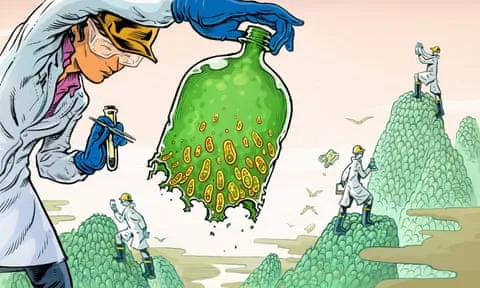
In 2016, Japanese scientists Oda and Hiraga published their discovery of Ideonella sakaiensis, a bacterium capable of breaking down PET plastic into basic nutrients. This finding marked a shift in microbiology's perception, recognizing the potential of microbes to solve pressing environmental issues.
France's Carbios has successfully applied bacterial enzyme technology to recycle PET plastic waste into new plastic products, aligning with the French government's goal of fully recycling plastic packaging by 2025.
2. HIV cases in Amsterdam drop to almost zero after PrEP scheme

According to Dutch AIDS Fund, there were only nine new cases of the virus in Amsterdam in 2022, down from 66 people diagnosed in 2021. The organisation claimed that 128 people were diagnosed with HIV in Amsterdam in 2019, and since 2010, the number of new infections in the Dutch capital has fallen by 95 per cent.
3. Cheap and drinkable water from desalination is finally a reality
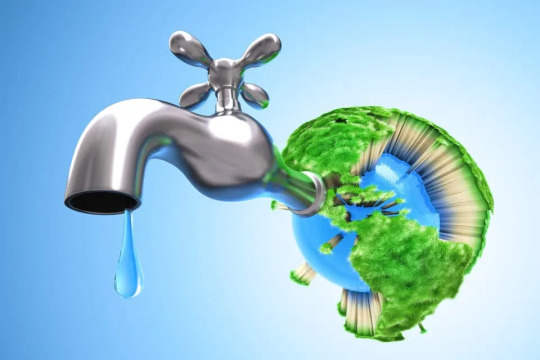
In a groundbreaking endeavor, engineers from MIT and China have designed a passive solar desalination system aimed at converting seawater into drinkable water.
The concept, articulated in a study published in the journal Joule, harnesses the dual powers of the sun and the inherent properties of seawater, emulating the ocean’s “thermohaline” circulation on a smaller scale, to evaporate water and leave salt behind.
4. World’s 1st drug to regrow teeth enters clinical trials

The ability to regrow your own teeth could be just around the corner. A team of scientists, led by a Japanese pharmaceutical startup, are getting set to start human trials on a new drug that has successfully grown new teeth in animal test subjects.
Toregem Biopharma is slated to begin clinical trials in July of next year after it succeeded growing new teeth in mice five years ago, the Japan Times reports.
5. After Decades of Pressure, US Drugmaker J&J Gives Up Patent on Life-Saving TB Drug
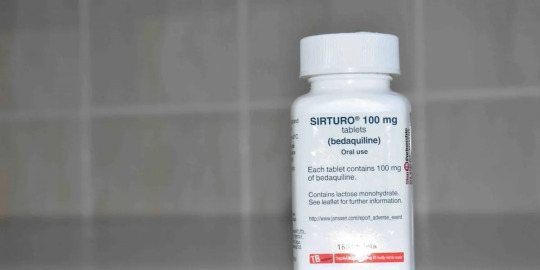
In what can be termed a huge development for drug-resistant TB (DR-TB) patients across large parts of the world, bedaquiline maker Johnson and Johnson said on September 30 (Saturday) that it would drop its patent over the drug in 134 low- and middle-income countries (LMICs).
6. Stranded dolphins rescued from shallow river in Massachusetts
youtube
7. ‘Staggering’ green growth gives hope for 1.5C, says global energy chief

The prospects of the world staying within the 1.5C limit on global heating have brightened owing to the “staggering” growth of renewable energy and green investment in the past two years, the chief of the world’s energy watchdog has said.
Fatih Birol, the executive director of the International Energy Agency, and the world’s foremost energy economist, said much more needed to be done but that the rapid uptake of solar power and electric vehicles were encouraging.
---
That's it for this week :)
This newsletter will always be free. If you liked this post you can support me with a small kofi donation here:
Buy me a coffee ❤️
Also don’t forget to reblog this post with your friends.
11K notes
·
View notes
Text
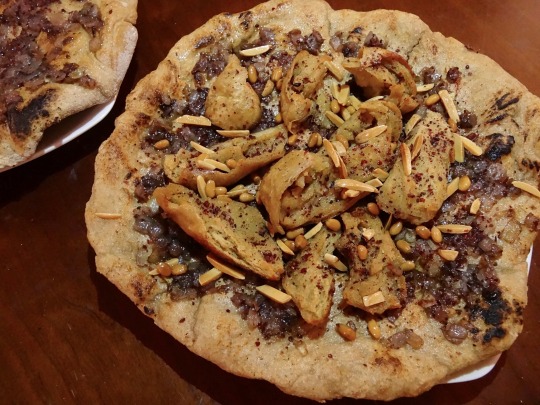

[ID: Two large flatbreads. The one in the center is topped with bright purple onions, faux chicken, fried nuts, and coarse red sumac; the one at the side is topped with onions and sumac. Second image is a close-up. End ID]
مسخن / Musakhkhan (Palestinian flatbread with onions and sumac)
Musakhkhan (مُسَخَّن; also "musakhan" or "moussakhan") is a dish historically made by Palestinian farmers during the olive harvest season of October and November: naturally leavened flatbread is cooked in clay ovens, dipped in plenty of freshly pressed olive oil, and then covered with oily, richly caramelized onions fragrant with sumac. Modern versions of the dish add spiced, boiled and baked chicken along with toasted or fried pine nuts and almonds. It is eaten with the hands, and sometimes served alongside a soup made from the stock produced by boiling the chicken. The name of the dish literally means "heated," from سَخَّنَ "sakhkhana" "to heat" + the participle prefix مُـ "mu".
I have provided instructions for including 'chicken,' but I don't think the dish suffers from its lack: the rich, slightly sour fermented wheat bread, the deep sweetness of the caramelised onions, and the true, clean, bright expressions of olive oil and sumac make this dish a must-try even in its original, plainer form.
Musakhkhan is often considered to be the national dish of Palestine. Like foods such as za'tar, hummus, tahina, and frika, it is significant for its historical and emotional associations, and for the way it links people, place, identity, and memory; it is also understood to be symbolic of a deeply rooted connection to the land, and thus of liberation struggle. The dish is liberally covered with the fruit of Palestinian lands in the form of onions, olive oil, and sumac (the dried and ground berries of a wild-growing bush).
The symbolic resonance of olive oil may be imputed to its history in the area. In historical Palestine (before the British Mandate period), agriculture and income from agricultural exports made up the bulk of the economy. Under مُشَاعْ (mushā', "common"; also transliterated "musha'a") systems of land tenure, communally owned plots of land were divided into parcels which were rotated between members of large kinship groups (rather than one parcel belonging to a private owner and their descendants into perpetuity). Olive trees were grown over much of the land, including on terraced hills, and their oil was used for culinary purposes and to make soap; excess was exported. In the early 1920s, Palestinian farmers produced 5,000 tons of olive oil a year, making an average of 342,000 PL (Palestinian pounds, equivalent to pounds sterling) from exports to Egypt alone.
During the British Mandate period (from 1917 to 1948, when Britain was given the administration of Palestine by the League of Nations after World War 1), acres of densely populated and cultivated land were expropriated from Palestinians through legal strongarming of and direct violence against, including killing of, فَلّاَحين (fallahin, peasants; singular "فَلَّاح" "fallah") by British troops. This continued a campaign of dispossession that had begun in the late 19th century.
By 1941, an estimated 119,000 peasants had been dispossessed of land (30% of all Palestinian families involved in agriculture); many of them had moved to other areas, while those who stayed were largely destitute. The agriculturally rich Nablus area (north of Jerusalem), for example, was largely empty by 1934: Haaretz reported that it was "no longer the town of gold [i.e., oranges], neither is it the town of trade [i.e., olive oil]. Nablus rather has become the town of empty houses, of darkness and of misery". Farmers led rebellions against this expropriation in 1929, 1933, and 1936-9, which were brutually repressed by the British military.
Despite the number of farmers who had been displaced from their land by European Jewish private owners and cooperatives (which owned 24.5% of all cultivated land in Palestine by 1941), the amount of olives produced by Palestinians increased from 34,000 tons in 1931 to 78,300 in 1945, evidencing an investment in and expansion of agriculture by indigenous inhabitants. Thus it does not seem likely that vast swathes of land were "waste land," or that the musha' system did not allow for "development"!
Imprecations against the musha' system were nevertheless used as justification to force Palestinians from their land. After various Zionist organizations and militant groups succeeded in pushing Britain out of Palestine in 1948—clearing the way for hundreds of thousands of Palestinians to be dispossessed or killed during the Nakba—the Israeli parliament began constructing a framework to render their expropriation of land legal; the Cultivation of Waste Lands Law of 1949, for example, allowed the requisition of uncultivated land, while the Absentees’ Property Law of 1950 allowed the state to requisition the land of people it had forced from their homes.
Israel profited from its dispossession of millions of dunums of land; 40,000 dunums of vineyards, 100,000 dunums of citrus groves, and 95% of the olive groves in the new state were stolen from Palestinians during this period, and the agricultural subsidies bolstered by these properties were used to lure new settlers in with promises of large incomes.
It also profited from the resulting "de-development" of the Palestinian economy, of which the decline in trade of olive oil furnishes a striking example. Palestinian olive farmers were unable to compete with the cheaper oils (olive and other types) with which Zionist, capital-driven industry flooded the market; by 1936, the 342,000 PL in olive oil exports of the early 1920s had fallen to 52,091 PL, and thereafter to nothing. While selling to a Palestinian captive market, Israel was also exporting the fruits of confiscated Palestinian land to Europe and elsewhere; in 1949, olives produced on stolen land were Israel's third-largest export. As of 2014, 12.9% of the olives exported to Europe were grown in the occupied West Bank alone.
This process of de-development and profiteering accelerated after Israel's military seizure of the West Bank and Gaza in 1967. In 1970, agriculture made up 34% of the GDP of the West Bank, and 31% of that of Gaza; in 2000, it was 16% and 18%, respectively. Many of those out of work due to expropriated or newly unworkable land were hired as day laborers on Israeli farms.
Meanwhile, Palestinians (and Israeli Palestinians) continued to plant and cultivate olives. The fact that Palestinians do not control their own water supplies or borders and may expect at any time to be barred by the military from harvesting their fields has discouraged investment and led to risk aversion (especially since the outmoding of the musha' system, which had minimized individual risk). In this environment, olive trees are attractive because they are low-input. They can subsist on rainwater (Israel monopolizes and poisons much of the region's water, and heavily taxes imports of materials that could be used to build irrigation systems), and don't require high-quality soil or daily weeding. Olive trees, unlike factories and agricultural technology, don't need large inputs of capital that stand to be wasted if the Israeli military destroys them.
Olive trees are therefore the chosen crop when proving a continued use of land in order to prevent the Israeli military from expropriating it under various "waste" or "absentee" land laws. Palestinians immediately plant olive seedlings on land they have been temporarily forced from, since even land that has lain fallow due to status as a military closed zone can be appropriated with this justification. The danger is so pressing that Palestinian agronomists encouraged this habit (as of 1993), despite the fact that Israeli competition and continual planting had lowered olive crop prices, and despite the decline in soil quality that results from never allowing land to lie fallow. In more recent years, olive trees have yielded primary or supplementary income for about 100,000 Palestinian families, producing up to 191 million USD in value in good years (including an average of 17,000 tons of olive oil yearly between 2001 and 2009).
Israeli soldiers and settlers have famously uprooted, vandalized, razed, and burned millions of these olive trees, as well as using military outposts to deny Palestinian farmers access to their olive crops. It prefers to restrict Palestinians to annual crops, such as vegetables and grains, and eliminate competition in permanent crops, such as fruit trees.
This targeting of olive trees increases during times of intensified conflict. During the currently ongoing olive harvest season (November 2023), Gazan olive farmers have reported being targeted by Israeli war planes; some farmers in the West Bank have given up on harvesting their trees altogether, due to threats issued by organized networks of settlers that they would kill anyone seen making the attempt.
The rootedness of olive trees in the history of Palestine gives them weight as a symbol of homeland, culture, and the fight for liberation. Palestinian olive harvest festivals, typically celebrated in October with singing, dancing, and eating, have inspired similar events elsewhere in the world, aimed at sharing Palestinian food and culture and expressing solidarity with those living under occupation.
Support Palestinian resistance by calling Elbit System’s (Israel’s primary weapons manufacturer) landlord, donating to Palestine Action’s bail fund, and donating to the Bay Area Anti-Repression Committee bail fund.
Ingredients:
For the dish:
2 pieces taboon bread, preferably freshly baked
2 large or 3 medium yellow onions (480g)
1 cup first cold press extra virgin olive oil (زيت زيتون البكر الممتاز)
1 Tbsp coarsely ground Levantine sumac (سماق شامي / sumaq shami), plus more to top
Ground black pepper
For the chicken (optional):
500g chicken substitute
5 green cardamom pods, or 1/4 tsp ground cardamom
4 cloves, or pinch ground cloves
1 Mediterranean bay leaf
1 Tbsp ground sumac
For the nut topping (optional):
2 Tbsp slivered almonds
2 Tbsp pine nuts
Neutral oil, for frying
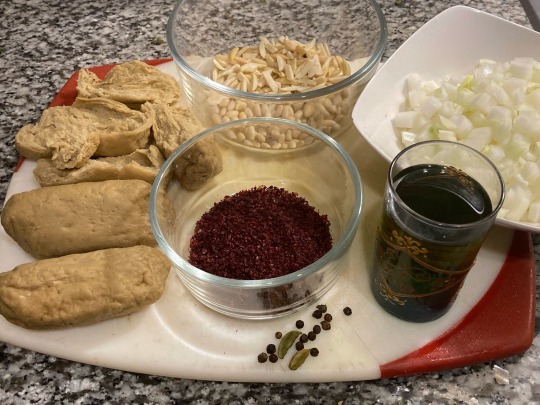
Notes on ingredients:
Use the best olive oil that you can. You will want oil that has some opacity to it or some deposits in it. I used Aleppo brand olive oil (7 USD a liter at my local halal grocery).
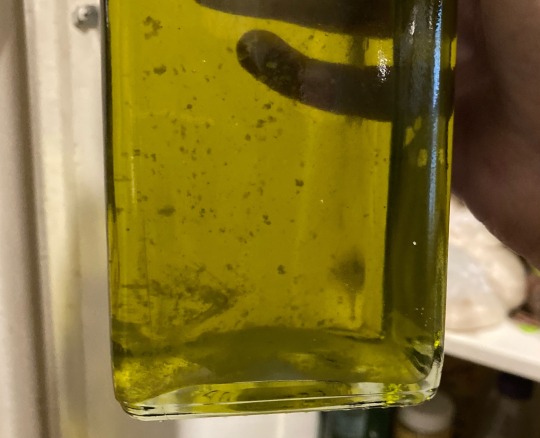
If you want to replace the taboon bread with something less laborious, I would recommend something that mimics the rich, fermented flavor of the traditional, whole-wheat, naturally leavened bread. Many people today make taboon bread with white flour and commercial yeast—which you might mimic by using storebought naan or lavash, for example—but I think the slight sourness of the flatbread is a beautiful counterpoint to the brightness of the sumac and the sweetness of the caramelized onions. I would go with a sourdough pizza crust or something similar.
Your sumac should be coarsely ground, not finely powdered; and a deep, rich red, not pinkish in color (like the pile on the right, not the one on the left).

For this dish, a whole chicken is usually first boiled (perhaps with spices including bay leaves, cardamom, and cloves) and then baked, sometimes along with some of the oil from frying the onions. I call for just frying or baking instead; in my opinion, boiling often has a negative effect on the texture of meat substitutes.
Instructions:
For the onions:
1. Heat a cup of olive oil in a large skillet or pot. Fry onions on medium-low, stirring often, for 10 minutes or until translucent.

2. Add 1 Tbsp sumac and a few cracks of black pepper and reduce to low. Cook for another 30 minutes, stirring occasionally, until onions are sweet, reduced in volume, and pinkish in color.
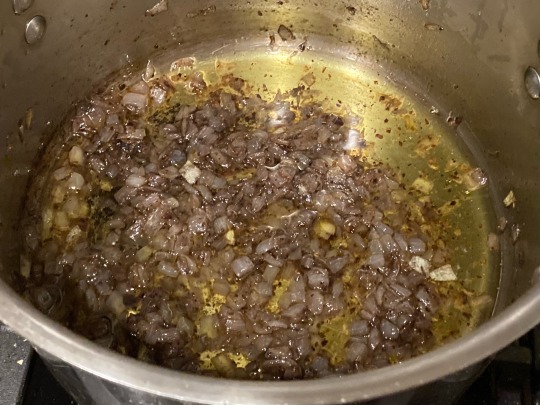
For the chicken:
1. Briefly toast and finely grind spices except for sumac (cardamom, cloves, and bay leaf). Filter with a fine mesh sieve. Dip 'chicken' into the pot in which you fried the onions to coat it with olive oil, then rub spices (including sumac) onto the surface.
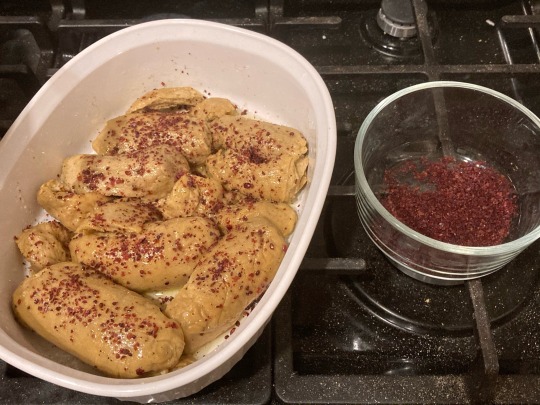
2. Sear chicken in a dry skillet until browned on all sides; or bake, uncovered, in the top third of an oven heated to 400 °F (200 °C) until browned.
For the nut topping:
1. Heat a neutral oil on medium in a small pot or skillet. Add almonds and fry for 2 minutes, until just starting to take on color. Add pine nuts and fry until both almonds and pine nuts are golden brown. Remove with a slotted spoon.
To assemble:
1. Dip each flatbread in the olive oil used to fry the onions, then spread onions over the surface.
Some cooks dip the bread entirely into oil; others press it lightly into the surface of the oil in the pot on both sides, or one side; a more modern method calls for mixing the olive oil with chicken broth to lighten it. Consult your taste. I think the bread from my taboon recipe stands up well to being pressed into the oil on both sides without tearing or becoming soggy.
2. Top flatbread with chicken and several large pinches more sumac. Bake briefly in the oven (still heated to 400 °F / 200 °C), or broil on low, for 3-5 minutes, until the sumac and the surface of the bread have darkened a shade.
3. Top with fried nuts.
Musakhkhan is usually eaten by ripping the chicken into bite-sized pieces, tearing off a bit of bread, and eating the chicken using the bread.
Some cooks make a layered musakhkhan, adding two to three pieces of bread covered with onions on top of each other before topping the entire construction with chicken and pine nuts.
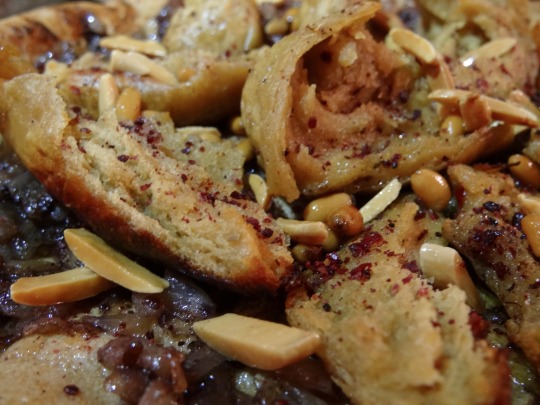
730 notes
·
View notes
Note
how do we know in the books that john is indigenous? can you say more about how his indigeneity is important to his story?
hello! so there is a word of god post on race (doesn't mention John but mentions that Gideon is "mixed Maori"), BUT I frankly don't think word of god statements are worth any weight without actual in-text support (see: the "dumbledore is gay" situation). SO!
Specific evidence that John Gaius is Maori, as revealed in Nona the Ninth:
When he is listing his education, John mentions having gone to Dilworth School (John 20:8). Dilworth is an all boys boarding school in Auckland and accepts students based on financial need instead of academic or sporting achievements. Demographics appear to be about 70% low income Maori boys, indicating that it is highly likely that John is Maori
John reports that P- said he looked like a "Maori-TV pink panther" (John 15:23) when his eyes turned gold. Maori TV is a TV station that is focused primarily on Maori culture & language revitalization, with presumably all or mostly Maori hosts, and tbh I don't see why P- would say this unless John was himself Maori
John uses a te reo Māori phrase ("kia kaha, kia māia") (John 5:20) when he is saying goodbye to the corpses in the cryo lab before the power is shut off. Though it is possible he said this as a non-Maori kiwi, but in combination with the previous two points of evidence I think this all very strongly points to him being Maori
He also renames his daughter Kiriona Gaia, "Kiriona" being just literally the name "Gideon" in te reo Māori
TLT is not a series that hands you anything on a silver platter but to ME this is all pretty solid proof
Why is this relevant to The Locked Tomb?
In Nona the Ninth, we learn that before he completed apotheosis and ate the solar system, John was basically trying to save the earth from capitalism-caused climate change. Climate justice and the rights of indigenous people over their own land are deeply tied together, in the same way that climate catastrophe and capitalism/ imperialism/ colonialism are linked. disclaimer that this is NOT my area of study and others have definitely said it better; this is just the basic gist as I understand it, but on quick search I found some sources here and here if you want to do some reading.
TLT is not a series that hands you anything on a silver platter, but i don't think it is a stretch to see John as an indigenous man trying to save the earth and getting ignored and shut down at every turn by primarily western colonial powers (PanEuro, the USA) who declare him a terrorist and then as a reader thematically connecting that to the experience of indigenous climate activists IRL
there are absolutely TLT meta posts that have discussed this before me; tumblr search is nonfunctional and I have been looking for an hour and a half and cannot find anything specific even though i KNOW i reblogged multiple posts about this in the first few weeks following NTN's release. sad & I am sorry
I think that by the time the books take place, John is 10k years removed from the cultural context he grew up in, with the Nine Houses having become a genocidal colonial power in their own right (with more parallels to be made between John's forever war for the resources of literal life energy and like, oil wars), but I also think that John Gaius is a fictional character who can represent and symbolize multiple different things in service of telling a story. (not to mention the potential thematic parallels being made to how oppressed people sometimes are pressed into replicating the power dynamics of their oppressors and continuing the cycle--now that is a tumblr post i KNOW i read last year and definitely cannot find right now, once again sad & I am sorry)
How Radical Was John Gaius, Really is a forum thread that was locked by the moderators after 234534645674564 pages of heated debate
#john gaius#nona the ninth#the locked tomb#tlt meta#i need to fix my tagging system fr#john meta#tlt thoughts#trb.txt#if anyone wants to add anything or correct anything PLS do so!!! i did my best hope this helps anon. this took me 2 hours
838 notes
·
View notes
Text
devils roll the dice, angels roll their eyes • ttfd
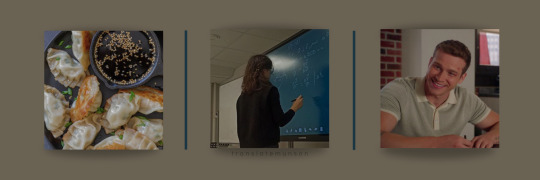
chapter one of the tortured firefighters department
masterlist | next chapter
cw: fem!reader, afab!reader, description of clothes, mentions of food, mentions of alcohol, proofread by my bye-lingual ass (let me know if i forgot anything)

You knocked on the white door again, not sure why you feel nervous about all of this. It’s just a small get-together at one of your coworker’s houses. For sure it’s better than spending another night in the library, writing your thesis, but it kinda makes you nervous.
So this is what life looks like when away from the screens that raised you?
From the East Coast all the way to LA to get your PhD, the city of angels was no more than a stranger on the window. Before moving, you had worked on the 9-1-1 call center for your region because the shift’s schedule could actually fit your undergrad and master’s schedule — also the money was enough to survive, and you could check your notes on slow shifts. But once after a massive power outage, your superior thought your desk was too small for your brain.
Not that you were a bad dispatcher — your responses and action times were above average, actually —, but he’d seen how you managed the data influx, pinning all the accidents, teams on call and reported issues on the white board and shouting directions for quicker routes and delay problems. After that, you’d spend more time helping fixing turnaround times and implementing some sort of algorithm and protocols for when the next disaster hits. At some point, they transferred you to Florida during the hurricane season because of your reputation — that spread like a wildfire, believe you or not.
You lasted enough to finish your master’s degree and hop on a plane to LA, for your PhD in dynamical systems theory. You had a job offer, leaving your 9-1-1 days behind for some small desk and endless boring demands. It didn’t last much, though, because, after eight months, it made you miss the adrenaline rush and large income of data from the 9-1-1.
That’s how you ended up at the Los Angeles 9-1-1 call center in Metro, always happy to jump on some calls and help other dispatchers with logistics and patterns. Nobody warned you about tsunamis or earthquakes, but you knew you could manage them just like a pro — if they ever happened again, which was a matter of time.
“Hey! I was starting to think you would bail on me!” Maddie opened the door, the genuine happiness glow irradiating and making her smile almost unbearable. “Please, come in.”
“Got caught up in traffic. Who knew the logistics mastermind would be stuck in a casual traffic jam?” You gave her the flowers you bought and held the brownie pan with both hands. “Hope I’m not too late.”
“Oh no, you arrived just in time! Here, let me take care of this,” she took the pan from your hands and motioned to the living room. “Make yourself at home. And thanks for the flowers!”
“Our last guest, finally!” Howard, aka Chim, Maddie’s boyfriend, left his place on the counter to greet you. “It’s nice to finally put a face to the voice!”
“Hope I didn’t disappoint you.” You hugged him, your extroverted persona finally happy to be in a room with real people, and not just some endless phone calls and work talk. “Sorry I’m late.”
“That’s ok, those guys are too busy with their games to notice we are a little behind schedule. But Jee is getting hangry” He pointed to the couch, where three adults, one child and one baby were too busy with the TV screen to notice your arrival.
“I guess the kid’s table is full tonight.”
“Hey, we’ve heard that!” One of them screamed from the couch, not bothering to look in your direction. He raised his arm, the tattoos across his skin showing against his white skin, in protest.
“Nice crowd.” You followed Maddie into the kitchen, Chim’s voice in the background saying it was the last race.
“I’m so glad you’re here. Water, juice or some alcohol?” She offered while reaching for the glasses. “Oh, Chim made some Margaritas.”
“I’d love one of those, thank you.” You fixed your green dress, somehow feeling overdressed. Not exactly your fault, when Maddie invited you for dinner, you visualized all the scenarios in your mind. Afraid of looking lazy, you went for a flowy green dress and a batch of brownies, to show some appreciation.
Between Margarita sips and after work gossip — because, nowadays, your work schedules mostly were off sync —, you helped Maddie setting the table and dishes. And, as expected, one race became four, with Chim playing the commentator. Maddie took the chance to show you the houses they were applying for, making good use of Jee’s quiet bedroom to talk.
“Are the others not good enough or just too expensive?” She had been talking about house scouting for weeks, and even helped you find a new place while doing so.
“You’d be impressed to see the final price of those houses once you track all the problems.” She played with her hair. “How’ve you been doing?”
“My thesis is starting to follow me like an unwanted ghost, and work has been— no, not gonna jinx it. Moving has been a pain in the ass, but thanks for telling me about that loft. The rent is actually acceptable and the view is amazing!”
“Glad it worked for you! And don’t thank me, actually it was—”
“Hey, Mads, we’re just waiting for you two.” The tall blue eyed guy stood in the hallway and gave the door a weak tap. Oh, tattoo guy, you noticed. “Chim is destroying the dumplings Albert made and Jee is not happy with being left out of the girls reunion. You better hurry up.”
“We are right behind you, Buck.” She said, bringing you with her to the dining table.
After some quick introductions — Albert, Chim’s half-brother; Eddie and his son Christopher, and Buck, Maddie’s little brother —, you indulged in some dumplings and pork ramen. Albert was experimenting with Korean cuisine, talking about opening a restaurant and finally having enough money to move out to his own place.
“Well, I think you should do it. I’d be happy to order this every day,” you said, pointing your chopsticks to the almost empty bowl.
“Thanks– sorry, what is your name again?”
“Everyone just call me Brains.” The nickname stuck since your first major catastrophe at the call center job — and maybe a little because of your bachelor.
“Wait, I think I’ve met you before.” Eddie announced and looked at Chris. “You went to his school a few weeks ago to talk about pursuing math in college, right?”
“I did a small presentation, yeah. My professor asked me for a favor since his kids are students there, but he had a full schedule. I had a nice time with the kiddos.”
“She is super smart!” Chris shared, in his own words, a little about your presentation. Talking to the younger ones about advanced math proved to be a challenge, but once you showed them all the cool things math made possible, you had their attention.
“Why are you working on the 9-1-1 instead of, I don’t know, teaching in college?” Buck inquired, beer in hand.
“Would you believe me if I said I have an adrenaline addiction and I can’t stay away from trouble?” You pressed your lips together and shook your head.
“Oh, he would, because he was addicted to—”
Maddie slapped Chimney on the arm. “Hey, there’s two kids in the room.”
And all eyes were on Chris, who was too busy with his noodles to notice, and Jee, playing with her bites of veggies. You laughed, leaving your empty cup on the table, and reaching for the last dumpling.
“I guess we are all addicted to something,” you stared at Buck's blue eyes and took a bite. “Maybe once I get my PhD, I’ll go full professor and find some adrenaline on handing out really hard exams. But the chances are very low.”
“You should try being part of LAFD, you might like it,” Albert suggested.
“I can barely carry my boxes upstairs, being that physical isn’t for me.” The admission made you shyly smile, because you were definitely hinting that firefighters were strong. “Math, on the other hand…”
“Please, don’t give her any more ideas! Since Brains started working with us, the dispatching process changed for the better.” Maddie brought her hands together and begged in a joking tone.
A few Margaritas and some dessert later, you were helping Maddie with the dishes while Albert played with Christopher, and Buck was holding Jee so she wouldn’t throw a tantrum. Chim asked Eddie to help with a few construction questions, feeling like he was missing some important topics while house scouting.
“I think I’m done for the night,” you told her as you closed the cabinet door. “Thanks for the invite, Maddie. You were right, I needed a break.”
“I know when I see someone on the verge of burnout.” You looked at her, the tequila making the simple action of laughing much more easier. “Let me know when you’re settled at your new place so I can get you a housewarming gift.”
“Oh please, don’t bother, Maddie. I’m sure you’re too busy with Jee and moving matters.”
“Sure you don’t want some ramen for tomorrow? Albert may be a good cook, but he has no idea of the measurements.”
“You’re sick of the smell, right?”
“A little.” She smirked.
“I guess I won’t have to worry about lunch tomorrow.”
“Make two, Mads!” Buck approached the kitchen counter. “Leaving already, Brains?”
“Yeah, gonna finish moving to my new place tomorrow.” Maddie left the blue tupperware in front of you. “Thanks, I’ll bring it to you next wednesday.”
“Can I get more brownies?”
“Anything for my favorite dispatcher.” You looked around, opting for a quick goodbye. “It was nice to meet y’all. Again, thanks for the invite, Maddie.”
“Nice to meet you too, Brains,” Buck said, getting closer. “Hope to speak to you soon, dispatcher Brains.”
“I hope we don’t, firefighter Buckley.” You teased him. “Have a good night, guys.”
You left Maddie’s place, drove to your new place, opened the door for an empty apartment, stored the ramen in the fridge, climbed up the stairs and fell face first into your bed, shoes and all.
If you didn’t know Maddie, you’d say she had second intentions with that dinner.

author's note: hi guys! chapters will be short because it helps me keep the momentum with the writing (and keep the impostor's syndrome away from my efforts). also yeah i'm using TTFD as an acronym bc i choose a whole ass long title for the fic. huge shout out to my love my bestie my soulmate @munsonsreputation for always supporting me (love you kaaaay). also hi casey welcome to the 9-1-1 fandom, thank you for the endless edits on tiktok haha. i guess i see y'all next week...
#evan buckley fanfic#evan buckley#evan buckley x reader#evan buckley x you#9 1 1 abc#9 1 1 fanfiction#evan buck buckely#buck fanfiction#evan buckley imagine#effie writes
161 notes
·
View notes
Note
got a question I was hoping you could answer!
why do all apps have to go through an app store? why doesn't anywhere have their app downloadable from the internet or something?
was wondering this because lots of issues with apps seem to stem from having to comply with app store guidelines and whatnot. So why not avoid that problem and make the app available off the appstore? And if part of it is because they're easier to find in the appstore, why not do both? why not also offer the download on a website or something?
there's gotta be some reason why there's afaik no one who offers a download for their app without the appstore right?
There are absolutely other ways to get apps, and the one that springs immediately to mind is the F-Droid App Repository.
Sideloading is the process of loading an app that doesn't come from your phone's OS-approved app store. It's really easy on Android (basically just a couple of clicks) but requires jailbreaking on an iphone.
The reason more USERS don't sideload apps is risk: app stores put apps through at least nominal security checks to ensure that they aren't hosting malware. If you get an app from the app store that is malware, you can report it and it will get taken down, but nobody is forcing some random developer who developed his own app to remove it from his site if it installs malware on your phone unless you get law enforcement involved.
The reason more developers don't go outside of the app store or don't WANT to go outside of the app store is money. The number of users who are going to sideload apps is *tiny* compared to the number of users who will go through the app store; that makes a HUGE difference in terms of income, so most developers try to keep it app-store friendly. Like, if tumblr were to say "fuck the app store" and just release their own app that you could download from the sidebar a few things would happen:
Downloads would drop to a fraction of their prior numbers instantly
iOS users would largely be locked out of using tumblr unless they fuck with their phones in a way that violates Apple's TOS and could get them booted out of their iOS ecosystem if they piss off the wrong people.
Ad revenue would collapse because not a lot of advertisers want to work with companies that are app-store unfriendly
They'd be kicked off of the main app marketplaces
So most people who develop apps don't want to put the time and effort and money into developing an app that people might not pay for that then also can't carry ads.
Which leads into another issue: the kind of people who generally make and use sideloaded app aren't the kind of people who generally like profit-driven models. Indie apps are often slow to update and have minimal support because you're usually dealing with a tiny team of creators with a userbase of people who can almost certainly name ten flavors of Linux and are thus expected to troubleshoot and solve their own problems.
If this is the kind of thing you want to try, have at it. I'd recommend sticking to apps from the F-Droid Repository linked up above and being judicious about what you install. If you're using apple and would have to jailbreak your phone to get a non-approved app on it, I'd recommend switching to another type of phone.
(For the record, you also aren't limited to android or ios as the operating system of your phone; there are linux-based OSs out there and weird mutations of android and such - I am not really a phone person so I can't tell you much about them, but they are out there!)
198 notes
·
View notes
Text
By combining food-bearing trees and shrubs with poultry production, Haslett-Marroquin and his peers are practicing what is known as agroforestry — an ancient practice that intertwines annual and perennial agriculture. Other forms include alley cropping, in which annual crops including grains, legumes, and vegetables grow between rows of food-bearing trees, and silvopasture, which features cattle munching grass between the rows. Agroforestry was largely abandoned in the United States after the nation’s westward expansion in the 19th century. In the 2022 Agricultural Census, just 1.7 percent of U.S. farmers reported integrating trees into crop and livestock operations. But it’s widely practiced across the globe, particularly in Southeast Asia and Central and South America. According to the U.N. Food and Agriculture Organization, 43 percent of all agricultural land globally includes agroforestry features. Bringing trees to the region now known as the Corn Belt, known for its industrial-scale agriculture and largely devoid of perennial crops, might seem like the height of folly. On closer inspection, however, agroforestry systems like Haslett-Marroquin’s might be a crucial strategy for both preserving and revitalizing one of the globe’s most important farming regions. And while the corn-soybean duopoly that holds sway in the U.S. heartland produces mainly feed for livestock and ethanol, agroforestry can deliver a broader variety of nutrient-dense foods, like nuts and fruit, even as it diversifies farmer income away from the volatile global livestock-feed market.
[...]
Trees actually have a much longer and more robust history in the Midwestern landscape than do annual crops. Think of the Midwestern countryside before U.S. settlers arrived, and you might picture lush grasses and flowers swaying in the wind. That vision is largely accurate, but it’s incomplete. Amid the tall-grass prairies and wetlands, oak trees once dotted landscapes from the shores of Lake Michigan through swathes of present-day Indiana, Illinois, Iowa, and Missouri, clear down to the Mexican border. These trees didn’t clump together in dense forests with closed canopies but rather in what ecologists call savannas — patches of grassland interspersed with oaks. Within these oak savannas, which were interlaced with prairies, tree crowns covered between 10 percent and 30 percent of the ground. They were essentially a transition between the tight deciduous forests of the East and the fully open grasslands further west. And in the region where Haslett-Marroquin farms — part of the so-called Driftless Area, which was never glaciated — trees proliferated even more intensely. In pre-settlement times, according to a 2014 analysis coauthored by Iowa State University ecologist Lisa Schulte Moore, closed-canopy forests of oaks, sugar maples, and other species covered 15.3 percent of the area, and woodlands (low-density forests) took up another 8.6 percent. Prairies — the ecosystem we readily imagine — composed just 6.9 percent. Oak savannas made up the rest.
10 September 2024
92 notes
·
View notes
Text

Week 8 - My Stand-In News from YYDS Entertainment
The police received complaints from villagers. Normally in a quiet alley there are never dogs. Well, many dogs are barking at the same time at yesterday late nightt. They tolerated for a while and finally couldn't stand it. They went out to see and found a young man age around mid-20 leading three dogs and ordering them to bark periodically. Creating distress for the people in that area. In the near distance, another male was found standing on the fence of the house. crying like he was in a drama. It is believed that it was a filming crew that filmed overtime without permission. The officer ordered a fine of 500 baht for the dog leash. The accused works as a secretary. The police kindly reminds them not to let it happen again.
Warning from official! Beware of high-interest informal loan gangs using force to collect debt illegally. Many people were damaged and injured. At this time there are no clues to the culprit. If seen, you can report it.
TONG-TINKARN IS APPRECIATIVE THAT THE PREMIERE OF 9 SWORDS THE MOVIE RECEIVED RESPONSES FROM FANCLUBS AND MEDIA. Tong-Tinkarn revealed that during filming, he worked hard in rehearsals. He played all the action sequences himself by not using a single stand-in. He got slightly injured during filming but worth it for this work. Thank you to the audience for the good response. He is confident that the second part will definitely receive higher income than the first part. And he is ready to become a billionaire movie star
Mike-Methiyut Akrahyothar, the new generation heirs of the Akrahyothar Group. He is glad that sales of light filter film for building continue to grow in the Thai market. There is also a large amount of exports to foreign markets. This helped him to win the election results from the most recent board meeting and sits on the podium as the new president of the Akaryothar Group. In an interview, he said that the company often produces products to solve problems in the daily life of consumers. Revealing company plans for the second half of the year, he is ready to enter the digital key market. The newest product can be used through the fingerprint and face scanning system. It solves problem for some users who like to forget their condo keycards. This digital key provides maximum security. The product is still under development.
So Ming had Secretary Jim make the dogs bark at him so he can dramatically cry and beg Joe to let him in. Meanwhile, his brother Mike is making yet another investment venture to prevent his brother from playing Romeo 😭😭😭😭😭😭😭

#my stand in the series#my stand in#yyds entertainment#they're unserious as hell and i loveeeee these tidbits#they're the best#my stand in you will always be that bl of 2024 for me#i love how interactive yyds is making the promo cycle of my stand in
100 notes
·
View notes
Text
ZATCA VAT & Tax Return System in ALZERP Cloud ERP Software
The ALZERP Cloud ERP Software offers a comprehensive tax return system designed to facilitate the calculation, moderation, and finalization of VAT and tax returns. This system ensures businesses comply with the Saudi Arabian tax regulations set by the Zakat, Tax, and Customs Authority (ZATCA). By automating and streamlining the tax return process, ALZERP helps businesses achieve accuracy and…

View On WordPress
#Automated tax compliance#Real-time tax monitoring KSA#Real-time VAT reporting KSA#Saudi business financial compliance#Saudi business tax management#Saudi corporate tax software#Saudi tax audit software#Saudi tax compliance software#Saudi VAT reconciliation software#Tax analytics for Saudi businesses#tax filing software#Tax management system#tax optimization tool#tax planning software#VAT fraud detection#VAT invoice management#VAT management#VAT management for Saudi SMEs#VAT reporting software KSA#VAT return automation Saudi#Zakat and income tax software#Zakat and tax automation#Zakat and tax consultation tool#Zakat and tax filing deadline alerts#Zakat and tax regulations update#Zakat and VAT calculator#Zakat and VAT compliance check#Zakat assessment tool#Zakat calculation software#Zakat declaration software
0 notes
Text
Full Article Text:
The United Kingdom is facing dire food shortages, forcing prices to skyrocket, and experts predict this is only the beginning.
What's happening?
According to a report by The Guardian, extreme weather is wreaking havoc on crops across the region. England experienced more rainfall during the past 18 months than it has over any 18-month period since record-keeping began in 1836.
Because the rain hasn't stopped, many farmers have been unable to get crops such as potatoes, carrots, and wheat into the ground. "Usually, you get rain but there will be pockets of dry weather for two or three weeks at a time to do the planting. That simply hasn't happened," farmer Tom Allen-Stevens told The Guardian.
Farmers have also planted fewer potatoes, opting for less weather-dependent and financially secure crops. At the same time, many of the potatoes that have been planted are rotting in the ground.
"There is a concern that we won't ever have the volumes [of potatoes] we had in the past in the future," British Growers Association CEO Jack Ward told The Guardian. "We are not in a good position and it is 100% not sustainable," Ward added.
Why is it important?
English farmers aren't alone — people are struggling to grow crops worldwide because of extreme weather.
Dry weather in Brazil and heavy rain in Vietnam have farmers concerned about pepper production. Severe drought in Spain and record-breaking rain and snowfall in California have made it difficult for farmers to cultivate olives for olive oil. El Niño and rising temperatures cut Peru's blueberry yield in half last year. Everyone's favorite drinks — coffee, beer, and wine — have all been impacted by extreme weather.
According to an ABC News report, the strain on the agriculture industry will likely continue to cause food prices to soar.
If these were just isolated events, farmers could more easily adapt — bad growing seasons are nothing new. The problem is that rising temperatures are directly linked to the increasing amount of gases such as carbon dioxide and methane in the atmosphere.
Since the start of the Industrial Revolution, humans have burned dirty energy sources such as coal, oil, and gas, which release a significant amount of those gases. Our climate is changing so drastically that the 10 warmest years since 1850 have all occurred in the last decade.
"As climate change worsens, the threat to our food supply chains — both at home and overseas — will grow," Energy and Climate Intelligence Unit analyst Amber Sawyer told The Guardian.
What can we do about it?
"Fortunately, we know many ways we can make the food system more resilient while reducing food emissions. The biggest opportunity in high-income nations is a reduction in meat consumption and exploration of more plants in our diets," said Dr. Paul Behrens, an associate professor of environmental change at Leiden University in the Netherlands.
If we replace a quarter of our meat consumption with vegetables, we could cut around 100 million tons of air pollution yearly. It may seem strange to suggest eating more vegetables with the decline in crop production. However, reducing the land and water used for animal agriculture and diverting those resources to growing more produce would drastically help the declining food supply.
Growing our own food is also a great way to reduce our reliance on store-bought produce, and it can save you hundreds of dollars a year at the grocery store.
124 notes
·
View notes
Text
On Thursday, Canada’s fiscal watchdog outlined how an automated tax filing system would benefit some Canadians, particularly those in low-income and vulnerable households who have never previously filed a return, or might have gaps in their filing histories. According to a 2020 study(opens in a new tab) conducted by two Carleton University professors, between 10-to-12 per cent of Canadians do not annually file their returns and might, as a result, miss out on benefits they're otherwise entitled to. The PBO revealed that if the automated system were to roll out now, eligible taxpaying households would receive more than $1.6 billion in benefits this current fiscal year. In five years, it will reach $1.9 billion.
Continue Reading
Tagging: @newsfromstolenland
92 notes
·
View notes